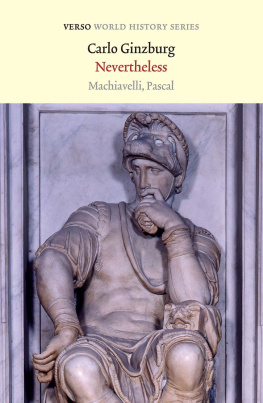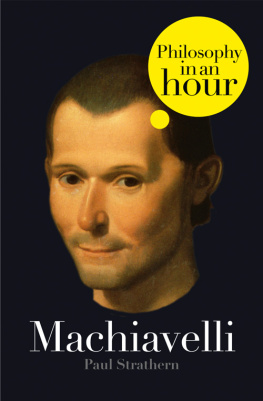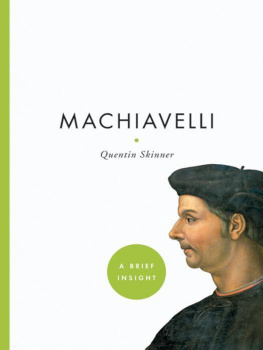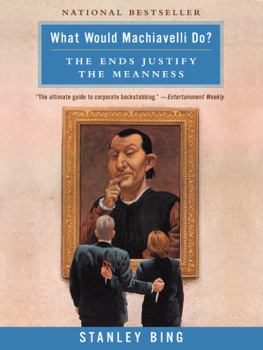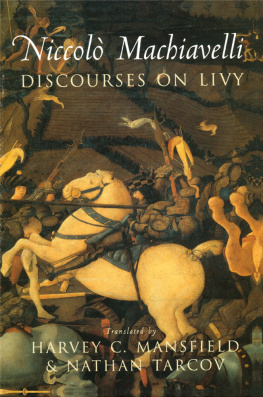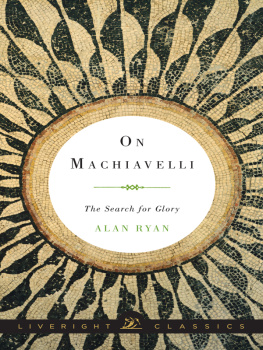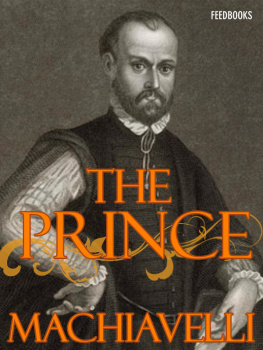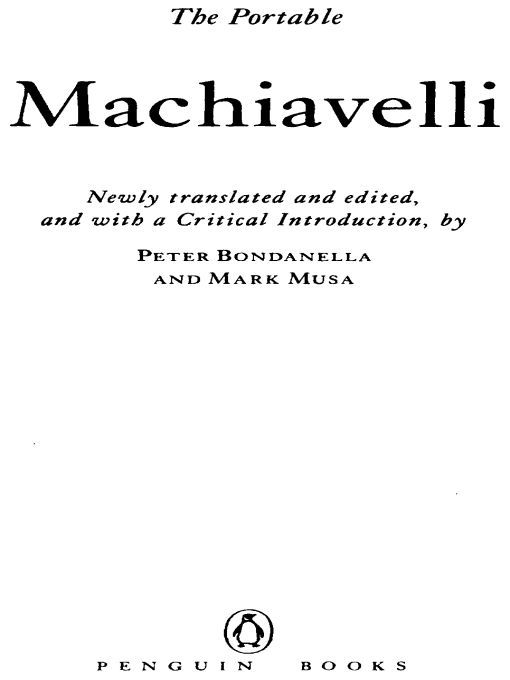Table of Contents
THE VIKING PORTABLE LIBRARY
Niccol Machiavelli
Niccol Machiavelli was born in Florence in 1469 of an old citizen family. Little is known about his life until 1498, when he was appointed secretary and Second Chancellor to the Florentine Republic. During his time of office his journeys included missions to Louis XII and to the Emperor Maximilian; he was with Cesare Borgia in the Romagna; and after watching the Papal election of 1503 he accompanied Julius II on his first campaign of conquest. In 1507, as chancellor of the newly appointed Nove di Milizia, he organized an infantry force which fought at the capture of Pisa in 1509. Three years later it was defeated by the Holy League at Prato, the Medici returned to Florence, and Machiavelli was excluded from public life. After suffering imprisonment and torture, he retired to his farm near San Casciano, where he lived with his wife and six children and gave his time to study and writing. His works included The Prince; the Discourses on the First Decade of Livy; The Art of War; and the comedy, Mandragola, a satire on seduction. In 1520, Cardinal Giulio de Medici secured him a commission to write a history of Florence, which he finished in 1525. After a brief return to public life, he died in 1527.
Peter Bondanella is Director of the Center for Italian Studies at Indiana University. He is the author of Machiavelli and the Art of Renaissance History.
Mark Musa is Professor at the Center for Italian Studies at Indiana University. A former Fulbright and Guggenheim Fellow, he has translated Dantes Vita Nuova and Inferno.
Each volume in The Viking Portable Library either presents a representative selection from the works of a single outstanding writer or offers a comprehensive anthology on a special subject. Averaging 700 pages in length and designed for compactness and readability, these books fill a need not met by other compilations. All are edited by distinguished authorities, who have written introductory essays and included much other helpful material.
EDITORS DEDICATION
For Thomas G. Bergin
INTRODUCTION
An Essay on Machiavelli
MACHIAVELLIS LIFE AND TIMES
When Niccol di Bernardo Machiavelli entered the world on May 3, 1469, his prospects were modest at best. The Machiavelli were an established middle-class family from the Oltrarno district of Florence, and its members had held an impressive number of offices in the citys government, including twelve terms as gonfaloniere, or standard-bearer, and fifty-four terms as prior. Niccols father, Bernardo, however, was not one of the more prosperous members of the clan, and Machiavelli could never hope to rival the wealth or influence of the greater patrician families of Florence, such as the Ridolfi, the Rucellai, the Strozzi, or the Guicciardini. But if Bernardos means were insufficient to guarantee his son instant access to economic and political power, his great interest in books, particularly the Latin classics, was perhaps a more valuable legacy. We know that he possessed a copy of Flavio Biondos Decades, that he borrowed a copy of Justins history, and that he obtained a prized copy of Livys history of republican Rome in return for laboriously compiling for the printer an index of Livys place-names.
Relatively little is known of Machiavellis activities until he entered the Florentine chancery, in 1498, only a few days after the execution of Girolamo Savonarola in the Piazza della Signoria. On June 19, 1498, his election as chancellor of the Second Chancery was confirmed by the Grand Council. Earlier in February of the same year, Machiavelli had been considered for a post in the government but was defeated. This earlier election was the last in which the supporters of Savonarola retained a majority; indeed, Machiavellis lack of sympathy for Savonarola, the man he would later remember in The Prince as the prototype of the unarmed prophet doomed to failure, is already evident in an early letter he composed in 1498 which describes one of the friars sermons. When Machiavelli was finally elected to the chancery, he benefited from a period of anti-Savonarolan feeling; he filled a vacancy caused by the expulsion of a Savonarola supporter.
The secretarys duties in the Second Chancery often overlapped with those of the more important and prestigious First Chancery. Both dealt with Florentine domestic and foreign affairs, including war and defense; both helped provide the Florentine republic with the governmental continuity and stability that might have otherwise been lacking in the republics rapid succession of office-holders on its deliberative bodies. Machiavelli was confirmed on January 27, 1500, and reelected annually until 1512. On July 14, 1498, he received the post of secretary to the Ten of War without, however, any additional staff or salary. Later he was also assigned to serve the newly created Nine of the Militia, a body designed to organize a militia from the Florentine countryside to avoid reliance on mercenary troops. He had supported a citizens militia after watching professional troops in the local wars against Pisa, and his faith in citizen soldiers never wavered throughout his life. His views on this topic, as well as on many others, were thus formed not only by the example of the ancient Romans, whom he always admired and cited, but also by his practical, formative years in the Florentine government.
Machiavellis service in the chancery also let him observe firsthand the major European political figures of the periodalthough his post would never permit him to wield the reins of political power on anything but a very limited scale. Even before his mentor Piero Soderini was named gonfaloniere for life on September 22, 1502, Machiavelli had become his trusted assistant. In 1500 he was sent abroad on his first diplomatic mission to the court of Louis XII, king of France. Arriving there with Caesars Commentaries on the Gallic Wars in his saddlebags, Machiavelli met the king (for whom he had little respect) and his powerful minister, Georges dAmboise, cardinal of Rouen. Not one to be overly impressed by rank or title, Machiavelli eventually had a sharp exchange of views with dAmboise over the political talents of the French and his own countrymen, one which he would later repeat in The Prince (III): When the Cardinal of Rouen told me that Italians understood little about war, I replied to him that the French understood little about politics. He would return to France on three other occasions: in 1503, 1510, and 1511.
Machiavellis three encounters with Cesare Borgia, the warrior son of Pope Alexander VI, were even more important for the formation of his ideas. These meetings took place in Urbino, Imola, and Rome between 1502 and 1503. Many of the dispatches sent to the republic by their envoys during these missions (some of which Machiavelli either wrote personally or helped others to compose) are still extant, and we may compare Machiavellis early assessment of this condottiere in his diplomatic letters to later treatments in several minor works and in the memorable seventh chapter of The Prince. When Machiavelli first met him at Urbino, after he had captured the city without a struggle, Borgia delivered an ultimatum to Florence which gave the young Machiavelli a lesson in power politics he would never forget: This government in Florence does not please me, and you must guarantee the observance of what you have promised me; otherwise, you will understand in a very brief time that I do not wish to live in this manner; and if you do not desire me as a friend, you will find me an enemy. While the territorial ambitions of Cesare Borgia represented a serious threat to Florentine hegemony in central Italy, Machiavelli could not help admiring the mans boldness, resolution, and cunning. In one of his dispatches describing the dukes character, we find one of the first instances in his works where ability or ingenuity (



